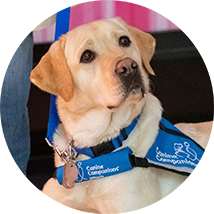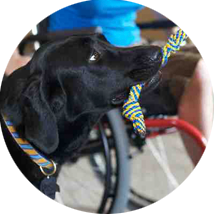A Service Dog Is
More Than A Vest™
Canine Companions Grassroots Advocacy Initiative
Joining other passionate volunteer advocates is an easy way to support Canine Companions! You can help amplify our position on legislation and policies that impact people with disabilities who rely on task-trained service dogs, including our clients. As a volunteer advocate, you can help in a variety of ways and with a commitment that fits your interest. You’ll also get exclusive access to educational webinars hosted by Canine Companions and guest presenters. Register as an advocate today!
- Sign our petitions
- Educate your community
- Email your legislators
- Support federal, state and local governance
- Meet with legislators
- Provide testimony for legislation
Help Empower Veterans Get VA Benefits
We hear from our clients that every Veterans Affairs (VA) hospital is interpreting the PAWS Act differently. Veterans tell us about the difficulty they encounter when filing for benefits and often being refused compensation for veterinarian care for their service dog. As a result, qualified Veterans living with PTSD are not receiving the benefits that they are entitled to by law.
What is a service dog?
The Americans with Disabilities Act (ADA) defines a service dog as a working animal trained in specific tasks that directly mitigate the effects of a handler’s disability. Animals whose sole function is to provide comfort do not qualify as service animals and are not permitted in public.
Service dog teams are permitted in any location the public is allowed if they meet the definition above and are in control and behaving in a safe manner.
What businesses can expect from a service dog team.
Service dogs must be clean, in control and behave in a safe manner. Aggression or continued misconduct, including barking, interfering with customers or toileting accidents can legally result in the dog’s removal from a business under the ADA.
Get Involved

Learn More
Find tips and best practices for grassroots advocacy.

Materials
Looking for materials? You can find Canine Companions’ service dog infographic, perfect for quick reference here.
